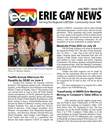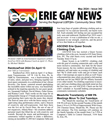The Best and Worst States for LGBTQ+ Equality
Out Leadership's 2023 State LGBTQ+ Business Climate Index finds "the state of LGBTQ+ access and equality in the U.S. is regressing"
NEW YORK CITY, NY - This year for the first time since Out Leadership began publishing the State LGBTQ+ Business Climate Index five years ago, the nation's overall average score on LGBTQ+ equality dropped -1.14 points. The net negative rating for the country is largely due to over 500 anti-equality bills introduced at the state level this legislative cycle.
The 2023 State LGBTQ+ Business Climate Indexreleased by Out Leadership, the premier global LGBTQ+ organization harnessing the power of business to drive equality, finds "the state of LGBTQ+ access and equality in the U.S. is regressing," signaling "increasing polarization across the country in political and cultural attitudes towards the LGBTQ+ community."
"The State LGBTQ+ Business Climate Index ranks each state and applies a numeric score out of 100 for how LGBTQ+ people experience living, working, building a family and building a life in each state. We use data from our partners at the Williams institute and LGBTMAP (Measurement advancement project) as well as our own research to measure lived experience for LGBTQ+ people in each state," explains Jane Barry-Moran, Managing Director, Research & Programs, Out Leadership.
Top 5 states for LGBTQ+ equality
1) New York - 93.67
2) Connecticut - 93.27
3) Massachusetts - 92.67
4) New Jersey - 90.00
5) Colorado - 88.67
Worst 5 states for LGBTQ+ equality
46) South Dakota -- 34.97
47) Tennessee - 34.40
48) Louisiana - 33.50
49) South Carolina - 32.50
50) Arkansas - 32.00
** The background document below gives key data points from this year's State LGBTQ+ Business Climate Index. The full index can also be viewed here. **
"As greater numbers of multinational companies continue to shift away from U.S. based operations, the business impact of this year's index points to a harmful effect for the nation's economy and job market," said Todd Sears, founder and CEO of Out Leadership. "Major corporate employers want to locate to places where they can recruit the best talent, without having to worry about state and local laws hindering their overall business success. Companies simply don't want to be at odds with the business policies and practices of the state they operate in, and they certainly don't want to feel attacked by them."
Some of this year's drivers responsible for the change in rankings include a range of anti-LGBTQ+ pieces of legislation targeting gender-affirming care, censorship laws like "Don't say gay," limits on transgender adult and youth rights, and the change in pro-LGBTQ+ leadership in the state.
"While the top ranked states for LGBTQ+ equality broadly are staying strong, the bottom ranked states decreased in score significantly. This continues to signal increasing polarization across the country in political and cultural attitudes toward the LGBTQ+ community,"said Brian Sims, Managing Director, Public Policy and Government Affairs for Out Leadership.
Out Leadership's State LGBTQ+ Business Climate Index is an assessment of all 50 states' performance on LGBTQ+ inclusion. The index measures the impact government policies and prevalent attitudes have on LGBTQ+ people residing in each state, quantifying the economic imperatives for inclusion and the costs of discrimination. It is a multidimensional index based on a broad array of markers of policies, attitudes, and measurements relating to LGBTQ+ inclusion. These markers are carefully chosen to accurately reflect the experiences of LGBTQ+ people in each state. You can view the index's methodology, here.
Sears concluded, "The economic outlook of anti-equality states is being imperiled by politicians more interested in scoring political points than protecting the future livelihoods of citizens."
Out Leadership recently released its annual OutQUORUM report, LGBTQ+ Board Diversity: Progress & Possibility,showing for the first time in history more than half of all Nasdaq-listed companies now have board diversity policies covering LGBTQ+, gender, race, ethnicity, and national origin.




